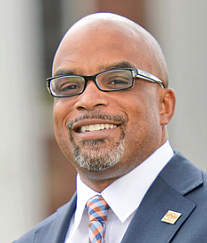VSU’s new homeowner program designed to make employees, community HAPI
Reginald Stuart | 2/23/2023, 6 p.m.
Virginia State University’s new program that will invest thousands of dollars to help its employees become homeowners also is designed to assist the economies of Petersburg and the village of Ettrick, where the university is based, according to the university.
The VSU “Home Assistance Payment Initiative,” also known as VSU-HAPI, will provide eligible homebuyers up to a $10,000 match toward the down payment or closing cost of a newly purchased home within the city limits of Petersburg or in the Village of Ettrick in Chesterfield County.
Eligible properties include a single-family home, townhouse, or condominium home.
In announcing the program last month, VSU officials said all of its 800 employees, from maintenance to professors and everyone in between, may inquire to see if they qualify for the program.
“Our HAPI program will have an economic and demographic impact on those communities we are part of,” said VSU President Dr. Makola M. Abdullah, noting that program is one of the most ambitious employee assistance programs in the county.
“We expect the program to further assist with retaining and attracting qualified employees,” he said, adding “If those employees live, shop, and educate their children in the community where they work, it will benefit our employees and the community tremendously. That makes this initiative a win-win.”
VSU said its new program is accessible to any current or future full-time employee of Virginia State University. They will qualify for the program if they meet the housing and Urban Development or HUD-approved loan criteria, according to the university.
Under the new employee incentive, VSU provides a one-to-one match for qualified employees, the announcement said. For example, if a homebuyer makes a $2,000 down payment, VSU will match the homebuyers $2,000. If a homebuyer makes an $8,000 down payment, VSU will provide an $8,000 match. Employees approved to participate in the program may receive up to a $10,000 match.
The strings attached are standard in employee incentive rules used in many industries. Employees who accept the VSU-HAPI funds must sign a retention agreement to remain at VSU for at least one year after receiving the funds. If they breach the agreement, they must repay the funds to the University.
The VSU employee assistance program is not a state or federal financial aid program. VSU-HAPI, is funded with university “discretionary funds,” Dr. Abullah and other university officials said, declining to identify any specific donors or benefactors.
The surprise announcement in mid-January came amid mixed economic signals in the metropolitan Richmond area and other parts of the country about the rising costs of housing, food and health care. Housing prices surged last year, widening the nation’s wealth gap.
“This is a very welcome move and can be a game changer for several reasons,” said Dr. Leonard Githinji, VSU Faculty senate chair and a specialist for Sustainable & Urban Agriculture.
“Firstly, it will bring VSU faculty geographically closer to students within the campus community,” said Dr. Githinji said. “It will boost the local economy around the VSU campus, and it will greatly motivate the VSU faculty, he added.
Tracy Lynne Jackson, an assistant professor of health and physical education at VSU, says the gesture by the university “shows us as faculty how committed the university was in making the job desirable and makes us competitive.”
Ettrick has a population of 7,241, according to the 2020 U.S. Census. Its median household income is roughly $61,000 a year and home prices run from $39,900 to $298,000, according to published real estate price ranges.
Petersburg, the largest nearby community, has an estimated population of 33,400 people.
This direct employee mortgage home assistance program is one of the first of its kind for employees of public colleges and universities in the United States.








